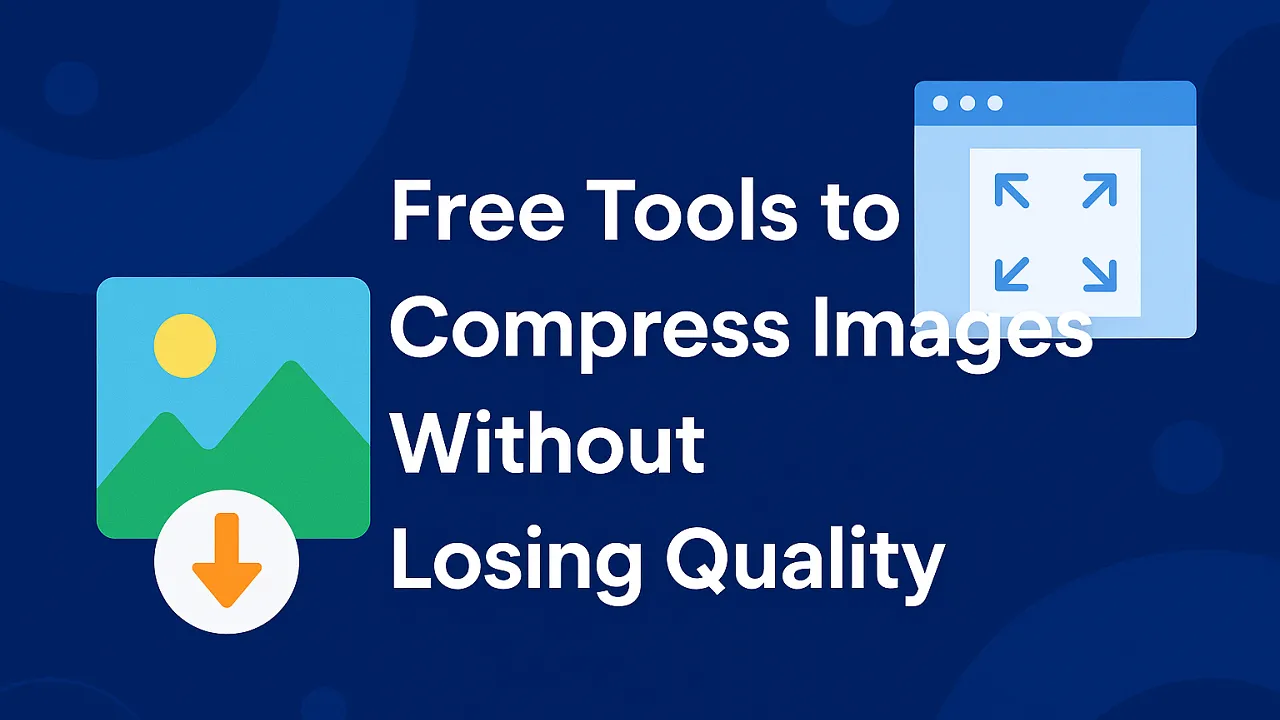
7 Free Tools to Compress Images Without Losing Quality – The Complete Guide
Whether you're a website owner, blogger, graphic designer, or just someone who wants to share images online, you’ve probably come across the need to reduce image file size. But here's the challenge: how do you compress images without losing quality? Is it really possible? In this post, we explore some of the most effective free tools to compress images without losing quality, how they work, and why they matter.
Is It Truly Possible to Compress Images Without Any Quality Loss?
Let's start with a bit of clarity. Technically speaking, image compression comes in two forms: lossless and lossy. Lossless compression retains every bit of image data, while lossy compression removes some data to reduce file size. However, modern online tools use advanced algorithms that apply lossy compression in a way that produces no noticeable difference to the human eye. This is often referred to as "visually lossless" compression.
So while you may not be retaining 100% of the original data, you’re still achieving a significantly smaller file size with images that look virtually the same—especially on screens. And that’s exactly what most users need for websites, blogs, social media, or email attachments.
7 Best Free Tools to Compress Images Without Losing Quality
Here are some of the most trusted and easy-to-use tools that deliver outstanding compression results:
- Image Compressor / Image Compressor: All-in-One SEO Kit (AIOSK) offers one of the most intelligent compression algorithm that maintains visual quality while removing unnecessary metadata. You'll get smaller files with virtually identical visual quality.
- Free PNG Compressor Online / Free PNG Compressor Online: This tool is completely free that uses advanced image compression libraries like browser-image-compression and pngquant.js to maintain transparency and color fidelity while drastically reducing file size and maintaning image quality. You can preview compressed images and download them individually or all at once in a convenient ZIP file.
- TinyPNG / TinyJPG: One of the most popular online tools. It uses smart lossy compression to reduce file size while preserving transparency and high-quality visuals.
- Squoosh by Google: Offers multiple compression options including MozJPEG and WebP. You can see a live comparison of before and after, which helps users maintain control over quality.
- Compressor.io: Offers both lossless and lossy modes. Supports JPEG, PNG, GIF, SVG, and WebP files, making it a versatile tool.
- ImageCompressor.com: An extremely simple drag-and-drop tool for instant compression. It focuses on preserving visual quality even when reducing file size significantly.
- Kraken.io (Free version): A performance-focused compressor trusted by developers and marketers. It offers bulk uploads and WordPress integration.
How Do These Tools Work?
These tools apply algorithmic compression techniques that reduce the amount of data stored in an image file while keeping the image’s appearance virtually unchanged. They do this by:
- Removing unnecessary metadata like camera settings and geolocation
- Optimizing color profiles and reducing color depth when appropriate
- Using efficient file formats such as WebP or MozJPEG
- Offering slider-based quality controls to let users fine-tune the balance between size and clarity
Benefits of Using Image Compression Tools
Compressing images without visible quality loss has numerous advantages:
- Faster Website Load Times: Smaller images mean quicker loading pages, which improves SEO and user experience.
- Reduced Bandwidth Usage: Ideal for mobile users and reduces server strain.
- Better Performance on Mobile: Compressed images load better on slower networks.
- Improved Google Ranking: Page speed is a known ranking factor in Google's algorithm.
- No Need for Expensive Software: These tools are completely browser-based and don’t require Photoshop or premium apps.
Who Should Use These Tools?
Anyone dealing with digital images can benefit from compression tools. This includes:
- Bloggers and Webmasters: Improve SEO and reduce page size.
- Social Media Managers: Optimize images for quick sharing and engagement.
- Students and Educators: Compress large files for projects or emails.
- Developers: Improve web app performance.
- eCommerce Stores: Load product images faster to boost sales.
Final Thoughts
In conclusion, while no tool can compress an image without any form of data loss, today’s advanced image compressors can reduce file size with no visible drop in quality. These free tools to compress images without losing quality offer a perfect balance between performance and practicality. Whether you're running a blog, designing a website, or just organizing your photo library, these tools will save you time, space, and stress—without compromising on image clarity.